A polyester sofa is a type of sofa that is made with fabric that is mostly or entirely composed of polyester fibers. Polyester sofas are a popular choice for their durability, comfort, and affordability. However, over time, they can accumulate dirt, stains, and unpleasant odors that can make them look and smell uninviting. Knowing to clean a polyester sofa properly not only improves its appearance but also helps to extend its lifespan.
In this article, we will provide you with some effective tips and tricks on cleaning a polyester sofa properly so it looks and feels like new for years to come.
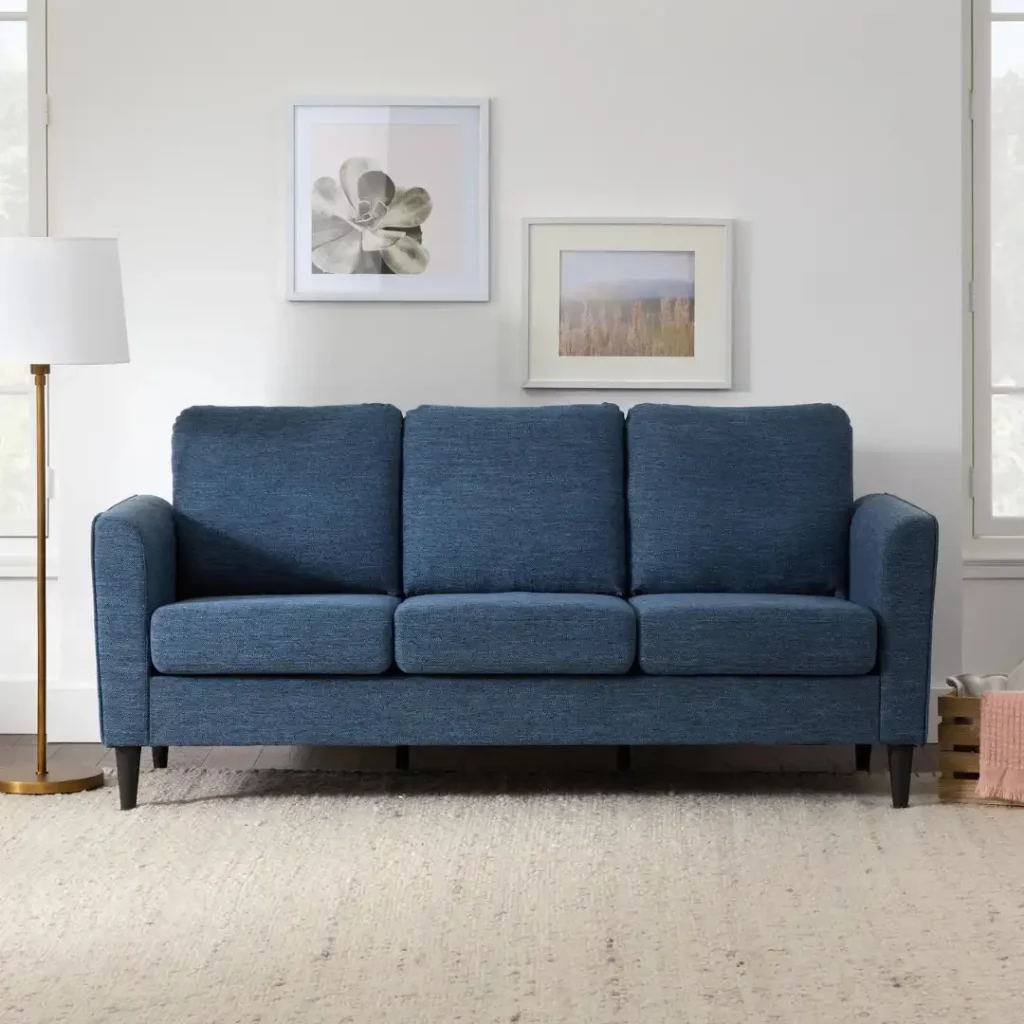
Type of polyester sofa
Polyester sofas come in a variety of styles, textures, and colors. In this article, we will introduce you to the most popular types of polyester sofas available in the market, including microfiber, suede, chenille, textured, velvet, printed, leather-look, etc. Whether you’re looking for comfort, style, or affordability, there’s a polyester sofa that will meet your requirements.
Microfiber Polyester Sofa
Microfiber polyester sofas are a popular choice for their softness, durability, and easy maintenance. The tightly woven microfiber fabric is known for its stain resistance, making it an ideal choice for families with kids or pets.

Suede polyester sofa
Suede Polyester Sofa
A suede polyester sofa is a type of sofa that is made of polyester fabric that mimics the texture and look of suede. Polyester is a synthetic fiber that is known for its durability and resistance to stains and wrinkles, making it a popular choice for upholstery. Suede, on the other hand, is a type of leather with a napped finish that is soft and velvety to the touch.

Chenille Polyester Sofa
A chenille polyester sofa is a type of sofa that is made of chenille fabric, which is a soft, plush, and textured material. Chenille is a type of yarn that is produced by weaving or knitting a fluffy, tufted cord together. Polyester is a synthetic fiber that is often used in upholstery due to its durability, resistance to stains, and affordability.

Essential supplies for cleaning a polyester sofa
Cleaning a polyester sofa requires a few essential supplies to ensure that the fabric is properly cleaned without causing any damage. These supplies include a mild detergent or upholstery cleaner, water, a soft-bristled brush, a microfiber cloth, a vacuum cleaner with an upholstery attachment, etc.
Vacuum cleaner:
When it comes to cleaning a polyester sofa, a vacuum cleaner with an upholstery attachment can be very helpful. An upholstery attachment typically has a soft brush or fabric strip that helps to remove dirt, dust, and debris from the fabric without damaging it.

Baking soda:
It’s an effective and natural way to clean a polyester sofa. Baking soda is a mild abrasive that can help to remove stains and odors from the fabric.
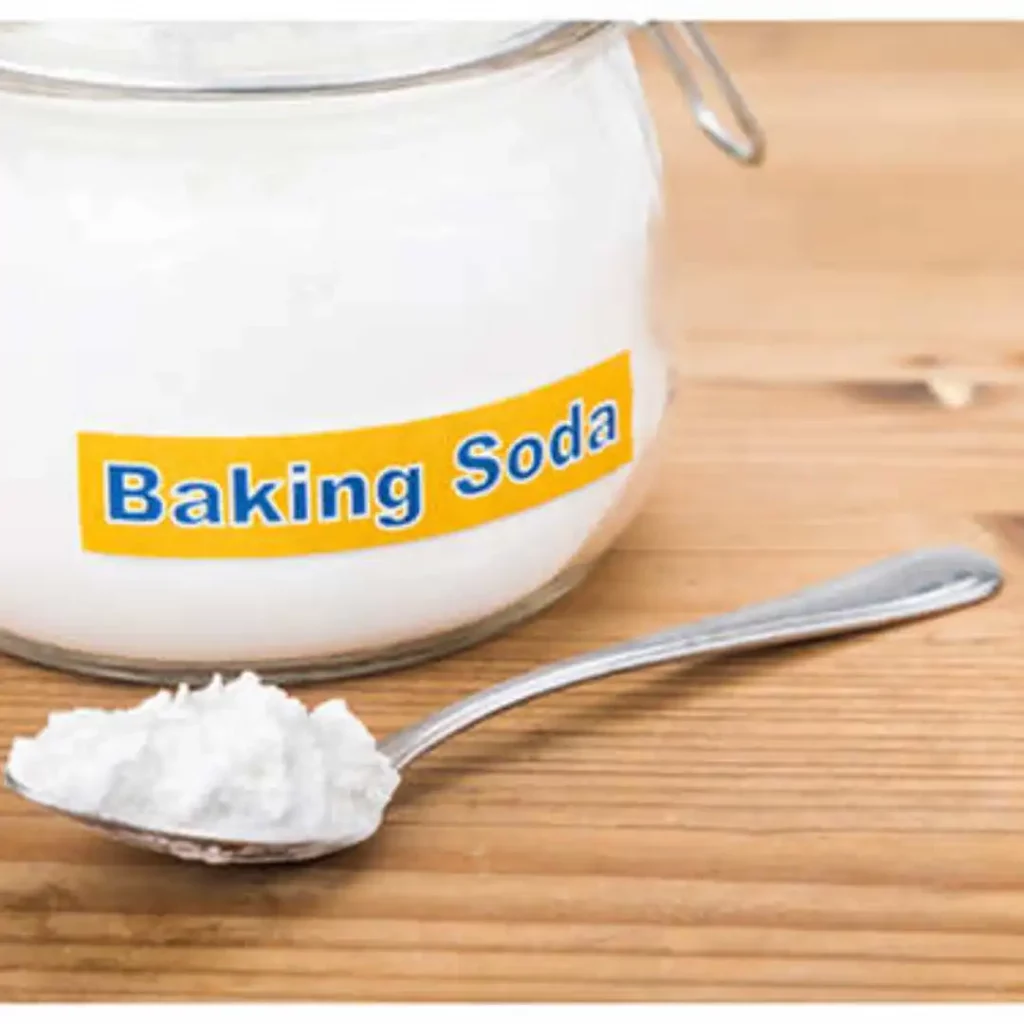
Soft-bristled brush:
To keep your polyester sofa clean and free from dust, dirt, and debris, one of the best tools to use is a soft-bristled brush. This type of brush is gentle enough to use on delicate fabrics, such as polyester, without causing any damage.

Lint roller:
A lint roller can also be a useful tool for cleaning a polyester sofa. It’s particularly effective at removing pet hair, lint, and other small debris from the surface of the fabric. Lint rollers typically have adhesive sheets that can be peeled off and disposed of, making them a convenient and hygienic option.
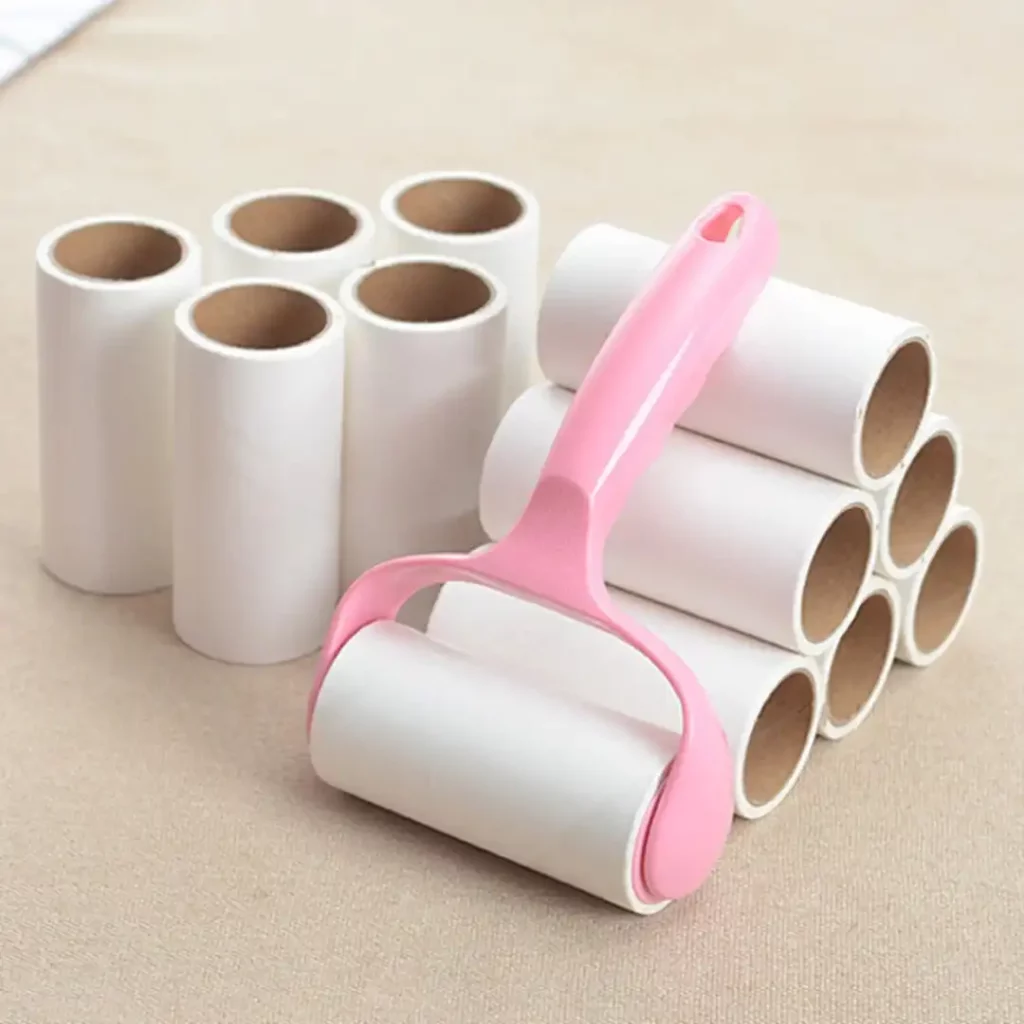
Rubber gloves:
Rubber gloves can be a helpful tool for cleaning a polyester sofa, especially if you’re dealing with pet hair or other small debris that may be difficult to remove with a brush or lint roller. To use rubber gloves for cleaning, put on a clean pair of gloves and lightly dampen them with water. Then, run your hands over the surface of the sofa, applying gentle pressure to pick up any loose debris.
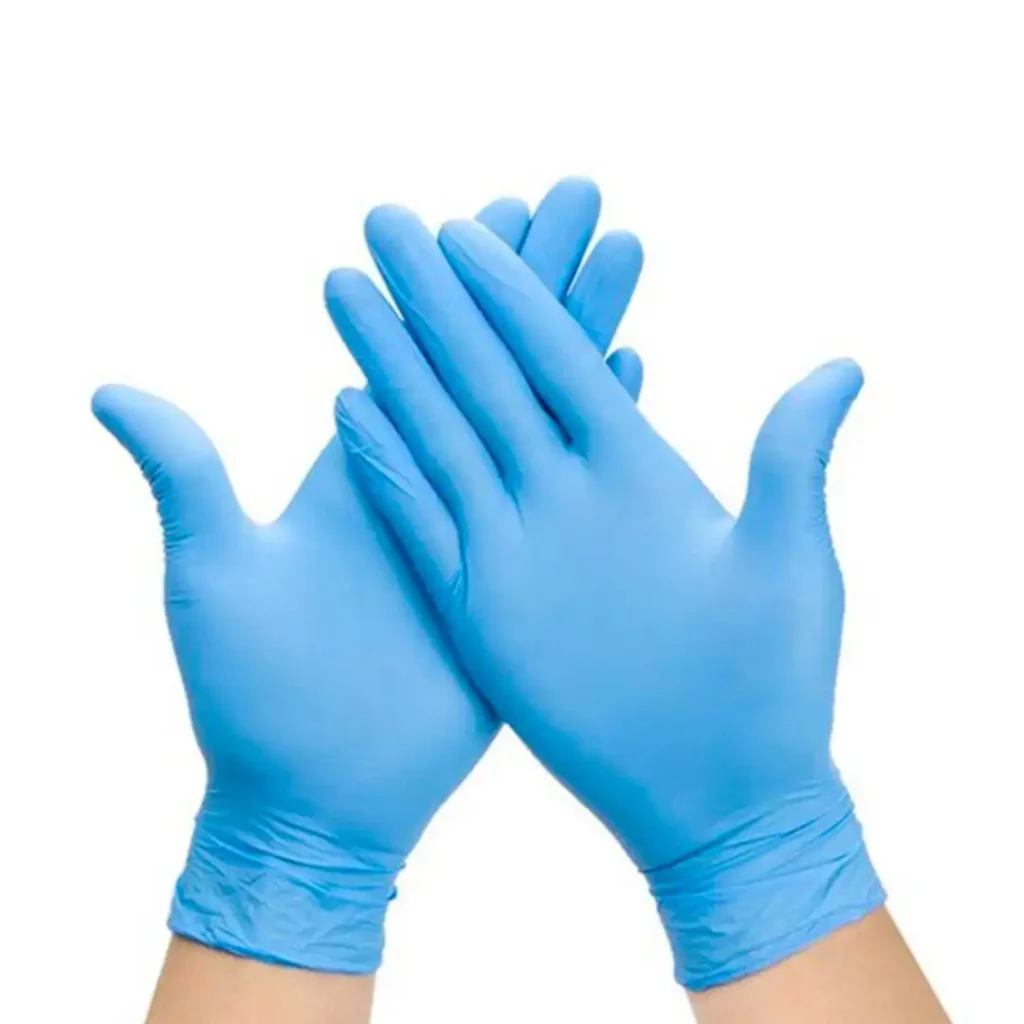
White vinegar:
White vinegar can be an effective and natural cleaning solution for polyester sofas, particularly for removing stains or odors. To use white vinegar for cleaning, mix equal parts white vinegar and water in a spray bottle. Then, lightly spray the solution onto the affected area of the sofa, being careful not to saturate the fabric.

Fabric cleaner:
A fabric cleaner specifically designed for polyester fabrics can be an effective and convenient solution for cleaning a polyester sofa. These cleaners are formulated to be gentle on the fabric while still effectively removing dirt, stains, and odors.

Mild laundry detergent:
Using a mild laundry detergent can be an effective and safe solution for cleaning a polyester sofa, especially if you’re dealing with a general buildup of dirt and grime on the fabric. To use laundry detergent for cleaning your sofa, start by vacuuming the fabric to remove any loose debris.
How to clean your Polyester Sofa?
Cleaning a polyester sofa is a simple process that can be broken down into the following steps:
Gather your cleaning supplies:
To clean your polyester sofa, you will need a vacuum cleaner, a lint roller, a rubber glove, a spray bottle, white vinegar, a fabric cleaner, or mild laundry detergent.
Begin by vacuuming the sofa:
Use a vacuum cleaner with a soft brush attachment to remove any loose dirt, dust, or debris from the sofa. Pay close attention to the crevices and corners where dirt and debris can accumulate.
Spot clean any stains or spills:
Use a cleaning solution such as white vinegar, mild laundry detergent, or a specialized fabric cleaner designed for polyester fabrics to remove any stains or spills on the sofa. Apply the cleaning solution to a clean, damp cloth, and gently blot the stain. Avoid rubbing the stain, as this can damage the fibers of the fabric and spread the stain further.
Use a soft-bristled brush:
Choose a brush with soft bristles that won’t damage or scratch the fabric of the sofa. Gently brush the surface of the sofa with the soft-bristled brush. Work in small sections and be sure to brush in the direction of the fabric grain to avoid damaging the fibers.
Use a lint roller to remove pet hair:
If you have pets, use a lint roller to remove any pet hair or fur from the sofa. Simply roll the lint roller over the fabric to pick up any loose hair.
Use a rubber glove to remove pet hair and dust:
Put on a rubber glove and rub your hand over the fabric of the sofa. The static electricity generated by the glove will attract any loose hair or dust, making it easy to remove.
Clean the entire sofa:
Once you have spot cleaned any stains or spills and removed any loose debris, use a fabric cleaner or mild laundry detergent to clean the entire sofa. Mix a small amount of the cleaner or detergent with water in a spray bottle, and lightly spray the solution onto the sofa. Use a clean, damp cloth to gently scrub the fabric, working in small sections and taking care not to saturate the fabric.
Rinse and dry the sofa:
After cleaning the sofa, rinse it thoroughly with clean water to remove any residual cleaner or detergent. Then, allow the sofa to air dry completely before using it again. Avoid using a hairdryer or heater to dry the sofa, as this can damage the fabric.
In summary, cleaning a polyester sofa involves vacuuming, spot-cleaning any stains or spills, using a lint roller and rubber glove to remove pet hair and dust, cleaning the entire sofa with a fabric cleaner or mild detergent, and rinsing and drying the sofa.
You can take help from this-
Mistakes to Avoid While Cleaning the Polyester Sofa:
Cleaning a polyester sofa can be a simple process, but it’s important to take care to avoid common mistakes that can damage the fabric. To ensure that your sofa stays in good condition and looks its best, it’s important to follow the manufacturer’s cleaning recommendations.
Test your cleaner first:
To test your cleaner, apply a small amount to a hidden area of the sofa, such as the underside or the back of a cushion, and wait a few minutes to see if there are any adverse effects. If there is no discoloration, fading, or other damage, it should be safe to use the cleaner on the rest of the sofa. If you do notice any adverse effects, stop using the cleaner immediately and consider trying a different cleaning solution or seeking professional help.
Safety first
When cleaning a polyester sofa, it’s important to keep safety in mind to avoid any accidents or harm to yourself or the fabric. Here are a few safety tips to keep in mind:
Wear gloves:
When working with cleaning solutions or solvents, it’s a good idea to wear gloves to protect your skin from any potential irritation or chemical exposure.
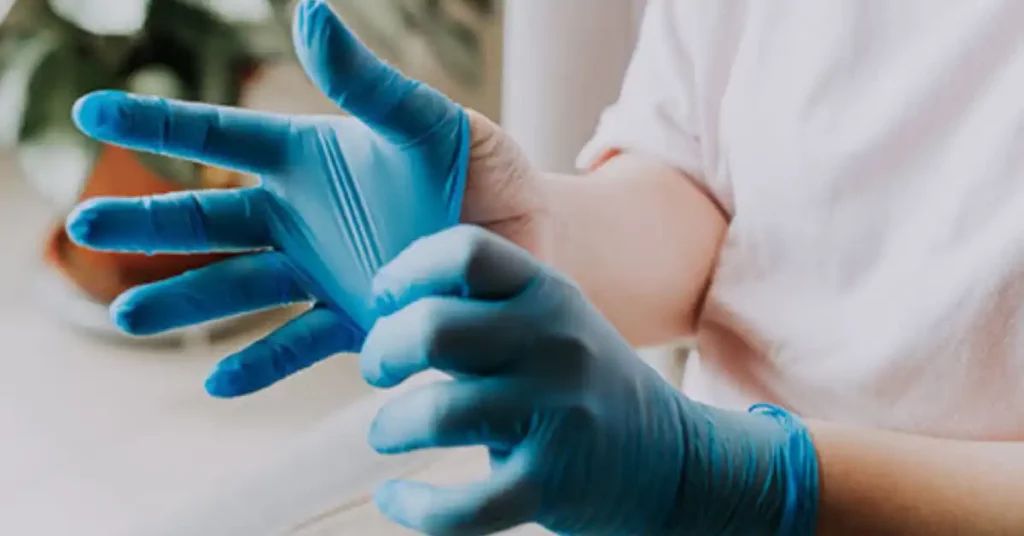
Ensure Proper Ventilation:
If you’re using any cleaning solutions that emit fumes, make sure you work in a well-ventilated area to avoid inhaling any harmful vapors.
Read labels:
Always read the labels on any cleaning solutions or solvents you’re using to ensure that they’re safe for use on polyester fabrics.
Use cleaner in small increments:
Using cleaner in small increments is crucial when cleaning a polyester sofa. By using a small amount of cleaner and working in small sections, you can avoid over-saturating the fabric and causing damage. Remember to blot the cleaner and remove any excess moisture to ensure the fabric dries quickly and evenly.
How to clean a polyester suede couch?
Polyester suede is a soft, textured fabric that can add a cozy and luxurious touch to any living space. To clean a polyester suede couch, follow these steps:
Brush the fabric:
Start by using a soft-bristled brush to gently remove any surface dirt or debris from the fabric.
Use a suede cleaner:
Apply a small amount of suede cleaner to a clean, soft cloth, and gently blot the stained area. Avoid rubbing the fabric too hard, as this can damage the texture.
Let it dry:
Allow the fabric to air dry completely before using the couch again. Do not use a hairdryer or other heat source to speed up the drying process.
Restore the texture:
After the fabric is completely dry, use a suede brush or towel to restore the texture of the fabric.
Protect the fabric:
Consider applying a suede protector spray to the fabric to help prevent future stains and keep it looking clean and fresh.
How to sanitize a polyester couch?
To sanitize a polyester couch, use a solution of equal parts water and white vinegar, and apply it to the fabric using a clean cloth or spray bottle. Allow the solution to sit for at least 10-15 minutes before wiping it away with a damp cloth. This will help to kill any germs or bacteria on the fabric’s surface.
How to remove stains from a polyester couch?
Removing stains from a polyester couch can be a tricky process, but here are some steps to follow:
Blot the stain:
If the stain is fresh, use a clean cloth to blot up as much of the stain as possible.
Use a cleaning solution:
Apply a small amount of mild detergent or upholstery cleaner to a clean cloth and gently blot the stained area.
Avoid rubbing:
Avoid rubbing the fabric too hard, as this can damage the fibers and make the stain worse.
Rinse and blot:
After applying the cleaning solution, rinse the fabric with a clean, damp cloth, and blot the area with a dry cloth to remove excess moisture.
Repeat if necessary:
For tougher stains, you may need to repeat the process several times or consider seeking professional cleaning services.
Conclusion:
Cleaning a polyester sofa can be a straightforward process as long as you follow the proper steps and precautions. By using gentle cleaning solutions, testing on a small area, and avoiding harsh chemicals, you can keep your sofa looking clean and fresh for years to come.
FAQ:
Is polyester fabric safe to clean with water?
Yes, polyester fabric is safe to clean with water. Water is often the primary ingredient in many cleaning solutions used for polyester fabrics.
How often should I clean my polyester sofa?
The frequency of cleaning a polyester sofa depends on how much it is used and exposed to dirt and spills. Generally, it is recommended to clean your polyester sofa every 6 to 12 months to keep it looking its best.
Is it safe to use bleach on a polyester sofa?
No, it is generally not safe to use bleach on a polyester sofa. Bleach is a powerful chemical that can cause discoloration and damage to polyester fabrics.
which elements are the best for cleaning polyester sofas?
Water, mild detergent, white vinegar, and upholstery cleaner are some of the best elements for cleaning polyester sofas.



